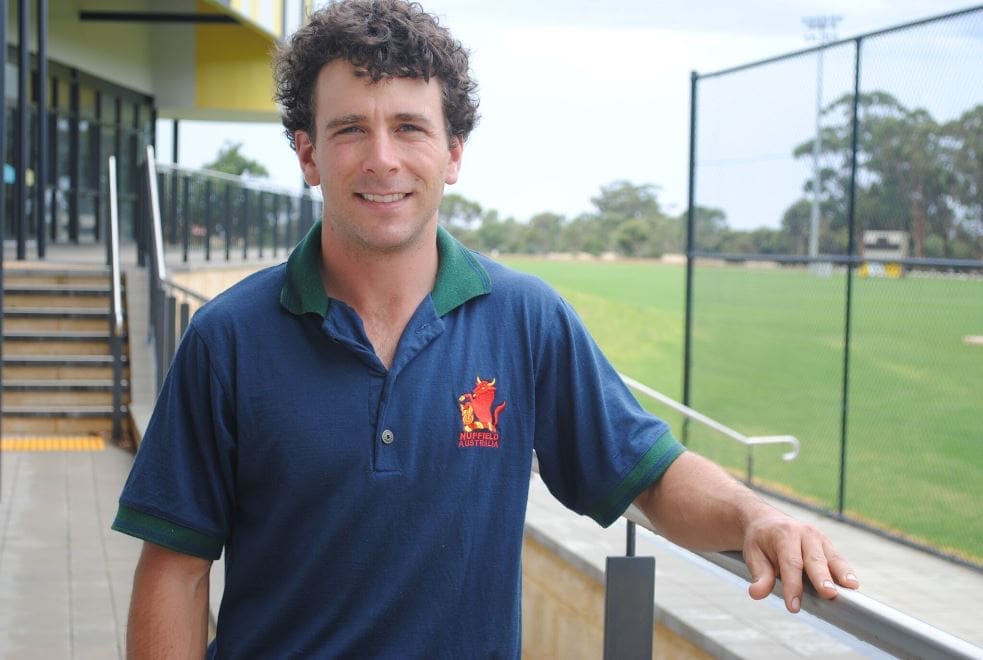Latest listings on Jobs Central recruitment page:
- General Manager – Grains Industry (Rimfire Resources client)
- Farm Operator – Dalby area, QLD (Stanbroke)
- Farmhand – NSW (Plowman Pastoral)
- Horticultural Manager (Minderoo Group)
- Assistant Farm Manager (Minderoo Group)
- AuctionsPlus operations positions (AuctionsPlus)
- Manager – Rawlinna Station, WA (Jumbuck Pastoral)
- Manager – Bulgunnia Station, SA (Jumbuck Pastoral)
- Domestic Sales Manager, Southern (JBS)
- Southern Livestock Manager (Rangers Valley)
- Leading Hand – Ucharonidge Station (Consolidated Pastoral Co)
- Caretaker Team – Springvale Station (Paraway Pastoral Co)
- Farm Hand (Blenheim Grazing)
Click here to access these and other exciting agriculture sector supply chain jobs currently listed on Jobs Central.

Nuffield scholar Reece Curwen found that on the most successful farms he visited overseas, the leadership style had shifted away from telling people what to do to empowering people and allocating responsibility.
HAVING the human capital to resource the future expansion of Australian agriculture as demand for food grows with global population expansion, has inspired the research of a Western Australian mixed enterprise farmer and Nuffield Scholar.
Reece Curwen, a 2015 Scholar and Stirling-based producer, manages his family’s 7500ha cropping program that includes canola, barley and wheat, in addition to 14,000 Merino ewes.
It was recognition that as farm businesses grow, so too does the need for team members, that led him on his two-year research journey, which included more than 16 weeks travel through 11 countries.
Mr Curwen said his study, which was supported by the Grains Research and Development Corporation, focused on investigating best practice in people management across the agricultural sector.
“People are our most important resource,” he said.
“But the reality of hiring and retaining staff in rural areas, particularly in primary industries at peak times of the year such as harvest, can be incredibly challenging. I wanted to understand how other managers in a similar position were inspiring and leading their teams, whilst at the same time boosting productivity on farm.”
The most successful farm businesses had mastered staff retention and were considered an ‘employer of choice’ in their industry and community.
Of all the farm businesses Mr Curwen visited overseas, he found the most successful had mastered staff retention and were considered an ‘employer of choice’ in their industry and community.
The strongest businesses were led by strong leaders that practiced good governance, core values, continual communication and accountability measures, he said.
“They empowered their employees, and gave them the tools to succeed, which led to increased professional and personal growth. This is particularly relevant for the younger generations, who are primarily motivated by a successful and positive culture, rather than salary or status.”
Mr Curwen’s research highlighted key areas of improvement for family farms including the need for more training, so as to encourage people to thrive in the workplace.
“Investing in training makes sense, particularly when people are so important,” he said.
“Continual training demonstrates that the business values its employees, it motivates team members to improve and allows them to take on more responsibility over time.
“The leadership style of successful farms had shifted away from telling people what to do to empowering people and allocating responsibility”
“Getting staff more involved in the business, both at a technical and strategic level pays off. On the most successful farms I visited, the leadership style had shifted away from telling people what to do to empowering people and allocating responsibility.
With Australian agriculture entering a new wave of growth and prosperity, there had never been a better time to sell the positive story of a career in farming and where it could take young stakeholders, he said.
“When a business or industry becomes attractive, it attracts people.”
Mr Curwen’s report includes a wide array of case studies and practical examples of where and how family farms are creating ‘winning teams’ to unlock the full potential of their employees, their business and their industry.
Reece Curwen’s Nuffield scholarship was supported by GRDC.



HAVE YOUR SAY